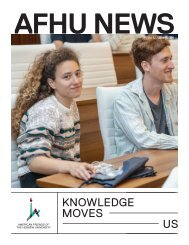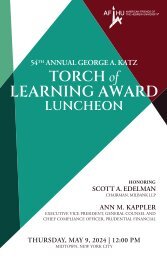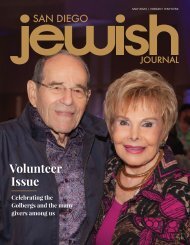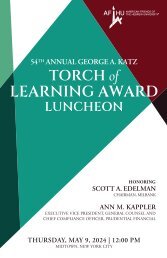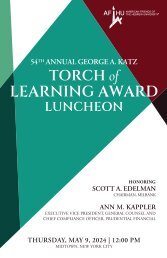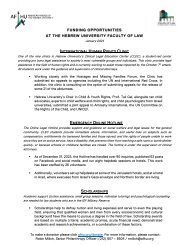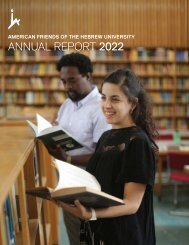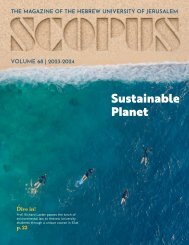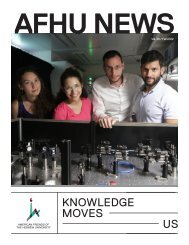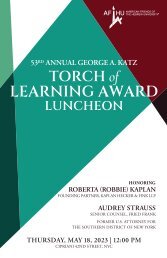SCOPUS
Create successful ePaper yourself
Turn your PDF publications into a flip-book with our unique Google optimized e-Paper software.
Research samples<br />
It’s All up in the Air:<br />
Transmission of the<br />
Coronavirus<br />
Dr. Nadav Kashtan (Plant Pathology and<br />
Microbiology) and Dr. Liraz Chai (Chemistry)<br />
are studying how the Coronavirus survives the<br />
journey between people, increasing transmission.<br />
In an initial study, Kashtan demonstrated that<br />
the virus survives better in microdroplets of<br />
saliva than other media (e.g. water). Now, the duo<br />
is studying the physio-chemical properties of<br />
saliva from different people, looking for factors<br />
that may influence variances in the survival rate<br />
of the virus.<br />
They hope that their interdisciplinary research<br />
will contribute to a slow in the virus’s spread.<br />
Living through a Pandemic:<br />
A Child’s Perspective<br />
Prof. Asher Ben-Arieh (Social Work), along with<br />
research assistants Sagit Bruck and Hamutal<br />
Farkash, conducted a survey of Israeli children’s<br />
experiences during Israel’s first shutdown. It<br />
was based on a questionnaire developed by<br />
Children’s World, an international project in<br />
which Ben-Arieh is a core member.<br />
The survey revealed that children were curious<br />
about the Coronavirus and wanted adults to<br />
listen and consider their perspectives. While<br />
remote learning, school wasn’t meaningful,<br />
and they experienced high levels of boredom.<br />
Compared with a study from 2017/18, the<br />
children reported feeling less satisfied and<br />
enjoying less freedom. At the same time, the<br />
majority reported feeling safe at home.<br />
Next the researchers hope to conduct a<br />
comparative, international study through the<br />
Children’s World network.<br />
Combatting Smoking and the<br />
Coronavirus<br />
Dr. Yael Bar-Zeev (Public Health) has no time for<br />
buzzwords such as ‘social distancing’ and ‘flattening<br />
the curve’ . Instead, she wants to understand how<br />
the pandemic and shutdown have affected Israelis’<br />
smoking habits. Together with Prof. Yehuda<br />
Neumark (Public Health), she conducted an online<br />
survey during the first shutdown.<br />
Approximately a third of responders who smoke<br />
reported increasing their intake during the<br />
shutdown. However, many responders expressed<br />
an interest in quitting and reported restricting<br />
smoking within their homes – giving Bar-Zeev<br />
hope. Along with other organizations, Bar-<br />
Zeev has outlined and continues to advocate for<br />
concrete steps that the Ministry of Health and<br />
HMOs can take to leverage smokers’ interest and<br />
help them quit – once and for all.<br />
Exploring the Effects of<br />
COVID-19 Contagion on<br />
Israeli Cities<br />
Dr. Yair Grinberger and Prof. Daniel Felsenstein<br />
(Geography) created a computerized simulation<br />
model for Israeli cities aimed at helping officials<br />
and decision-makers understand and plan for<br />
the long-term effects of disasters upon their<br />
cities. Until recently, this model was used<br />
for large scale catastrophic events such as<br />
earthquakes, fires, and missile attacks.<br />
They have now expanded the model’s capabilities<br />
to include a pandemic module, based on the public<br />
health SEIR model of contagion: Susceptible,<br />
Exposed, Infected, and Removed (recovered/dead).<br />
As their model explicitly addresses distributional<br />
questions, they hope to help decision-makers<br />
understand how particular pandemic policies,<br />
such as lockdowns and curtailing mobility, might<br />
affect diverse communities differentially.<br />
Two Advanced Drug Delivery<br />
Systems<br />
Prof. Gershon Golomb (Institute for Drug<br />
Research) is an expert in developing drug<br />
delivery systems. Two of his ongoing projects<br />
are perfectly poised to help COVID-19 patients.<br />
The first project is an anti-inflammatory<br />
drug formulation, which is wrapped in nanoparticles<br />
that deliver the drug directly to the<br />
body’s immune system. The drug has completed<br />
two phases of FDA testing.<br />
The second project is through the Fraunhofer<br />
Project Center for Drug Discovery and Delivery<br />
at the Hebrew University. It aims to employ<br />
small interfering RNA (siRNA) and drugs to<br />
disrupt the replication of the virus within the<br />
human body. Golomb is developing a navigator<br />
that will target lung cells, resulting in a more<br />
effective Coronavirus treatment.<br />
Caring for Those Who Care for<br />
Others<br />
Jordan Hannink Attal recently graduated from the<br />
International Master of Public Health, defending<br />
her thesis during the shutdown. Having spent two<br />
years studying Israel’s population of migrant care<br />
workers (MCWs), Hannink Attal immediately<br />
began studying MCWs’ well-being during the<br />
Coronavirus shut-down.<br />
Along with her coinvestigators, Prof. Yehuda<br />
Neumark (Public Health) and Dr. Ido Lurie,<br />
MPH, the team discovered that many MCWs<br />
suffered from depression and anxiety, lacked<br />
food security, and didn’t have adequate access<br />
to Ministry of Health guidelines. Furthermore,<br />
many of their rights under Israeli law were being<br />
trampled. Hannink Attal is currently conducting<br />
her third study, focused on the post-lockdown<br />
period.<br />
Social Isolation Adversely<br />
Affecting Well-Being<br />
PhD student Lior Zeevi and Dr. Shir Atzil<br />
(Psychology) collected and analyzed video diaries<br />
recorded during Israel’s first shutdown. By coding<br />
the subjects’ behavior second-by-second, the<br />
researchers were able to analyze their well-being<br />
and regulatory processes.<br />
The researchers divided the subjects into three<br />
groups: singles, couples, and couples with children.<br />
Their data show that single men and fathers had<br />
the worst self-regulation, while women tended<br />
to fare better overall. The study also showed that<br />
improved self-regulation is associated with better<br />
relationships, especially in times of crisis.<br />
Predicting Non-Adherence to<br />
Public Health Directives<br />
Dr. Yehuda Pollak (Education) applied his<br />
knowledge of ADHD and risk-taking to identify<br />
predictors of non-adherence to the new public<br />
health restrictions, with the understanding that<br />
non-compliance endangers not only the individual,<br />
but their surroundings as well.<br />
Conducted along with PhD student Haym Dayan,<br />
Prof. Itai Berger (Social Work) and HU alumna<br />
Dr. Rachel Shoham, Pollak’s two studies revealed<br />
several factors – some of which were pre-existing<br />
(e.g. gender) and some of which correlated with<br />
respondents’ current state (e.g. psychological<br />
distress). These studies were the first to show a<br />
correlation between non-adherence to ADHD, a<br />
history of risk-taking behavior, criminal activity,<br />
and more.<br />
22 | 2020-2021<br />
| 2020-2021<br />
23



